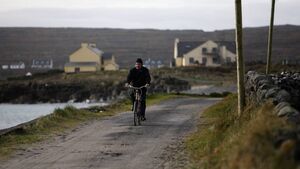The choices we make trigger rural decline

An islander cycles along a road on Inis Mor, the largest of the Aran Islands, in 2007. Picture: Matt Cardy/Getty Images
The worthwhile article written by Liam Heffron in the on December 31st last is a worthy one in a line of similar articles over recent decades.
First some context. Most towns in Mayo have rarely been as populous as they are now. Surely these are classed as rural Ireland. Rural two-teacher schools have never been better resourced than they are today. Across the county, secondary schools have added extensions to cater for the rising numbers of students.
Rural populations thrived -until there were better options – in a totally different economy. That was the protectionist economic model of de Valera, retired by Lemass. Today’s Irish economy is driven by clusters of factories and office blocks making highly valuable pharma and technological products for export. Some of them bring well-paid jobs to towns in Mayo, which are surely also part of rural Ireland.
Being hyperactively capitalistic, being the most open economy in the world, has made Ireland a mostly rich land. But this developmental model has always encouraged and demanded urbanisation.
The resulting depopulation of certain rural areas outside of towns (most of which are growing) that Liam Heffron writes of is the logical outcome of decades of government developmental policy. Decades of Fianna Fáil and Fine Gael-led governments voted in by rural and urban voters prioritised a developmental model imported from the IMF and implemented in many Western – and Asian – countries.
This model: Invest in education, invest in manufacturing, encourage foreign direct investment (FDI) and remove barriers to trade. The developmental goal then and now in poorer countries across the world is rural depopulation: get people off the land and into what are classed as more productive jobs - adding more in value to the national GDP.
Urbanisation was, and still is, a mainstay of capitalist developmental thought – and not just capitalist. Marx held rural life in contempt for it limited the potential developmental and organisational potential of the proletariat.
The consensus then has long been that education, industrialisation and urbanisation held the keys to prosperity.
Membership of the EU turbocharged the demise of rural commerce – the local supermarkets, grocers and butchers - in the Irish context. Joining the single market allowed Ireland to become a beachhead for American corporations. But it also made Ireland an open market for German retailers - and their Irish suppliers – who brought Aldi and Lidl to most towns in Ireland. How can a small-town retailer compete with the economies of scale of a hyper-competitive multinational beast? It can’t.
A popular presence - sought and welcomed by county councillors across the country - Aldi is also voracious about knocking out competitors including Irish shops selling food, clothes and hardware. Pubs are also feeling the Aldi effect. The arrival of Aldi, Lidl and Tesco is welcomed yet has the very impact on rural economies and social fabric bemoaned by Liam Heffron.
Logically, if the rural decline written about has animated so much discussion then it’s parties like People Before Profit or rural independents like Gerry Loftus – who seek state spending on public amenities, transport and social facilities – that deserve the rural vote. But voters have embraced the free market ethos of Irish centrist political parties which have held power and ushered in this model.
Surely that’s the choice voters have made, voters who want to shop in Aldi, holiday in Florida and build a house from a drawing by a Clontarf architect, the bigger the better, in rural Mayo.
Universal access to education - an admirable goal - was never going to create generations of rural dwellers seeking to remain in situ. After the brain drain of poorly educated rural youth in the 1950s and early '60s, later generations were able to realise their potential educationally - even if many of these brains were also drained by emigration.
Our economic model educates us for high-paid urban jobs. Farm-raised solicitors, accountants and software engineers went to metropolises like Dublin because that’s where the work was. There are a limited amount of openings for the professions in Ireland’s rural towns and villages.
This is a worldwide phenomenon. China’s rural villages are retirement homes emptied of youths working in big cities. Spain’s rural exodus is a national psychodrama, a constant topic of national radio shows. Italy offers rural homes to migrants for a nominal euro if they promise to invest in them.
Most finance graduates from Mayo have no intention of being anywhere other than in the banking hubs of London, Hong Kong or New York, no matter how plaintive their comments on a article written, ironically, in the urban sprawl of Los Angeles.
We have many immigrants very keen to live in rural Ireland and to work jobs that natives no longer want. How to integrate these people into the vacant rural homes and small schools that will seek pupils amid a dropping Irish fertility rate: this would make for the topic of another article, one that would require some difficult questions to be asked and answered in the current climate.





